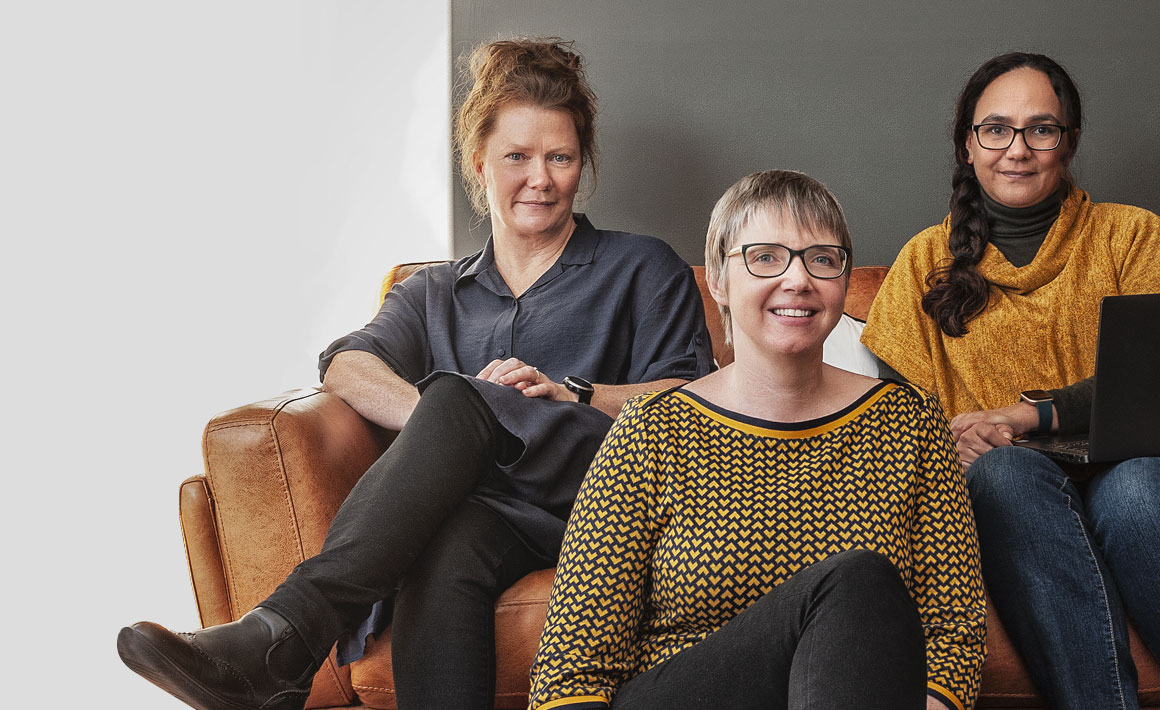 Associate Professor Sara Walton, Dr Paula O'Kane and Dr Diane Ruwhiu: “We would like to see this sudden, nationwide social experiment on working from home become a more permanent reality for some.”
Associate Professor Sara Walton, Dr Paula O'Kane and Dr Diane Ruwhiu: “We would like to see this sudden, nationwide social experiment on working from home become a more permanent reality for some.”When New Zealand went into lockdown this year, organisations and employees had to adapt rapidly to new ways of working. The Work Futures Otago team asks if these new ways of working will become a permanent reality for some or if being back in business simply means a return to the status quo.
Working from home became the new normal for many people this year. But what will work and workplaces look like after COVID-19?
The Work Futures Otago team – led by Associate Professor Sara Walton, Dr Paula O'Kane and Dr Diane Ruwhiu, all from the Department of Management – has conducted a survey aiming to understand employee experiences of remote working during lockdown. What adjustments were made to enable working from home? How did the quick move impact well-being and productivity? And what lessons can be learned by both organisations and employees about how remote working might be sustained post COVID-19?
The survey, conducted during Alert Level 3 of the COVID-19 pandemic, received around 2,500 responses and showed that during this extraordinary time, participants working from home felt productive and the majority were keen to keep the flexibility of working from home at least once a week.
“People continued to work. It didn't matter where and when they worked as long as the job was done,” says O'Kane.
“We would like to see this sudden, nationwide social experiment on working from home become a more permanent reality for some. Will we question the way we've been conditioned to organise our work and workplaces, or will employers expect a return to the status quo? These questions frame our thinking about our work future, in New Zealand and internationally.”
The Work Futures Otago team, established in 2013, uses a narrative approach to analyse and forecast the trends, future projections and potential disruptions in New Zealand as far as 2040. Completed research includes studies on the future of work, Dunedin to 2030, information and communication technologies in Dunedin to 2040, and high value manufacturing across Aotearoa New Zealand to 2040. The team is currently exploring the ageing workforce of the future, low carbon economies, building resilience for the future and – prompted by the COVID-19 pandemic – employee experiences of remote working during lockdown.
Remote working is an aspect of workplace flexibility that needs to be managed for it to work well, the researchers say. It is more than just closing offices and sending people home.
“Remote working can be a useful source of increasing productivity for some workers through a management approach focusing on the outcomes of work, but we think that this should be balanced with social interaction to maintain healthy work teams,” says Walton.
“For organisations and managers, it means exploring or, at the very least, being open to new modes of management beyond the traditional command-and-control model. For employees, it is about the realisation of work-life balance. Organising work around our day, rather than organising our day around work, empowers individual responsibility and organisational trust, enabling productivity and creativity to flourish,” says O'Kane.
Just as lockdown raised both challenges and opportunities in regards to new uptake of existing technologies such as Zoom, Skype, Microsoft Teams and Dropbox, the focus now on rebuilding the economy brings new opportunities around jobs and training, both named as priority areas in the government's 2020 Budget.
“Organising work around our day, rather than organising our day around work, empowers individual responsibility and organisational trust, enabling productivity and creativity to flourish.”
Now is the time to ask what skills and capabilities are needed for a resilient socio-economic future, says Walton.
“The younger generation has seen first-hand what has happened to many jobs during this economic crisis and they will be expecting a more resilient workplace. For employers, that means to attract top talent they will have to illustrate how they can provide that flexibility and resiliency,” she says.
This event has also opened people's eyes to situations and experiences they previously could not fathom, says Ruwhiu.
“The minimal wages of so many of our essential workforce was a surprise, but not a surprise. The conditions of some of our essential workers were also invisible, but yet nonetheless felt at an individual level. Will we demand change post-COVID or will we just go back to our normal busy-ness and render invisible again the many inequities experienced in the labour market?”
This is a time for imagination and innovation to take a front seat as countries rebuild economies, say Walton, O'Kane and Ruwhiu. Aotearoa can, and should, take a leading role in the response to this turning point. “We have demonstrated foresight and resilience in our responses to the Christchurch terror attacks and now COVID-19, and we can continue this with the responses in the near future to recover from this unprecedented global lockdown.”
Funding
University of Otago